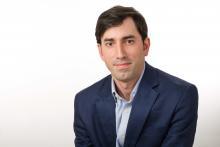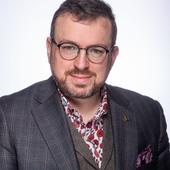How open science can help solve Zika and prepare us for the next pandemic
"A growing number of vocal researchers have advocated that all research funded with public funds is open sourced, and not just the articles but the actual research data sets."
With the advent of synthetic biology and gene editing tools, there are amazing breakthroughs being made in medicine, energy and food. Within a few years, we will see cures for debilitating diseases, new biofuels, and grains that can be grown in extreme climates. We will also have many new nightmares: bioterrorism and well-meaning experiments that get out of hand. Imagine a superbug that can cure — or kill — millions of people or a virus which targets one person, say, a U.S. president. This is not science fiction; it is happening.
In 2011 a scientist, Craig Venter, created a new life form by transplanting a computer-designed genome into the cell of a bacterium that had had its DNA removed. Today, a gene-editing technique called CRISPR is being used to engineer extra-muscular beagles, micro-pigs, super-goats, and ever-white mushrooms. Chinese researchers have edited human embryos. The cost of doing basic synthetic biology experiments is only a few thousand dollars, for lab gear and chemicals, and it is possible to design and order up DNA sequences on the Internet.
We are not ready for the consequences of these technologies. We need to urgently develop new bio-defenses, rethink our laws, and bring together researchers from all over the world to solve the problems as soon as they occur.
We can start by forming a global coalition to attack the Zika virus.
Zika is propagated by mosquitoes and causes birth defects in infected mothers. It is likely to spread worldwide within the next year. The solution may lie in open-sourcing information — as leading researchers have recommended.
In February, a high-powered group of health organizations including research institutes, academic journals, NGOs, and funding bodies published a public commitment to “sharing data and results relevant to the current Zika crisis and future public health emergencies as rapidly and openly as possible.” Signatories included journals Nature and Science, Bill and Melinda Gates Foundation and the U.S. National Institute of Health.
Said Jeremy Farrar, Director of the Wellcome Trust in the statement, “Research is an essential part of the response to any global health emergency. This is particularly true for Zika, where so much is still unknown about the virus, how it is spread and the possible link with microcephaly. It’s critical that as results become available they are shared rapidly in a way that is equitable, ethical and transparent. This will ensure that the knowledge gained is turned quickly into health interventions that can have an impact on the epidemic.”
Open science has been a topic of debate for over a decade. A growing number of vocal researchers have advocated that all research funded with public funds is open sourced, and not just the articles but the actual research data sets. The logic follows similar logic to open source software. When more eyes can look at data, it is less likely the data will contain errors — and solutions can be developed jointly. Just as in software, scientists anticipate that by open sourcing more medical data, they will enable more breakthroughs by increasing the body of pre-vetted knowledge and reducing the redundancy in research efforts.
This type of information sharing did not happen effectively with last major epidemic that sparked global concern, the Ebola virus. When Ebola was raging through West Africa in the summer of 2014, a group at the Broad Institute in Cambridge, Mass. published open repository sequence data for 99 Ebola genomes taken from patients in Sierra Leone’s Kenema government hospital. This open sourcing of critical scientific data was the second instance in the outbreak. A team of international researchers had initially published three genomes from patients in Guinea in April.
For the next three months, no more genomic data was released to the public data repositories that had become the go-to source for scientists studying Ebola. The silence puzzled many prominent scientists. A formidable array of genomic sequencing technology was aimed squarely at the virus. Yet the data was not shared.
This delayed progress and troubled three of the most prominent Ebola researchers, Nathan Yozwiak, Stephen Schaffner and Pardis Sabeti. They published a plea for data sharing in the leading scientific journal Nature, titled “Make outbreak research open access.”
Sharing data among researchers has long been a thorny topic. In the cutthroat competition to place articles in top scientific journals — the key currency in academic circles — researchers have traditionally held data close to the vest so as not to jeopardize the exclusivity of their findings and, by extension, article acceptance. Conversely, for pandemics such as Ebola and influenza, security experts have feared that publishing genomic data would allow evil scientists or regimes to stand on the shoulders of upstanding researchers and use publicly published genomics data to create equally or even more lethal pathogens that can kill millions.
A decade ago, when sequencing genomes was incredibly expensive, tedious, and hard, some of the arguments for holding data closed did make sense. This provided a viable moat against rogue states and organizations. But today, the cost of DNA sequencing and synthetic biology experimentation has dropped to the point that anyone can do it; the bad guys already have the resources to unleash bioterrorism.
The good news is that there are far more people in the world who want to do good than bad. We need to bring together the hundreds of thousands of scientists who want to use technology to better the world and solve critical problems. The best way is to create communities and begin crowdsourcing critical research.
For Vivek Wadhwa's site, please click here.
To follow Vivek Wadhwa on Twitter, please click here.
TO FOLLOW WHAT'S NEW ON FACTS & ARTS, PLEASE CLICK HERE!
Vivek Wadhwa is a Fellow at Arthur & Toni Rembe Rock Center for Corporate Governance, Stanford University; Director of Research at the Center for Entrepreneurship and Research Commercialization at the Pratt School of Engineering, Duke University; and Distinguished Fellow at Singularity University. He is author of “The Immigrant Exodus: Why America Is Losing the Global Race to Capture Entrepreneurial Talent”—which was named by The Economist as a Book of the Year of 2012, and ” Innovating Women: The Changing Face of Technology”—which documents the struggles and triumphs of women. In 2012, the U.S. Government awarded Wadhwa distinguished recognition as an “Outstanding American by Choice”— for his “commitment to this country and to the common civic values that unite us as Americans”. He was also named by Foreign Policy Magazine as Top 100 Global Thinker in 2012. In 2013, TIME Magazine listed him as one of The 40 Most Influential Minds in Tech.
Wadhwa oversees research at Singularity University, which educates a select group of leaders about the exponentially advancing technologies that are soon going to change our world. These advances—in fields such as robotics, A.I., computing, synthetic biology, 3D printing, medicine, and nanomaterials—are making it possible for small teams to do what was once possible only for governments and large corporations to do: solve the grand challenges in education, water, food, shelter, health, and security.
In his roles at Stanford and Duke, Wadhwa lectures in class on subjects such as entrepreneurship and public policy, helps prepare students for the real world, and leads groundbreaking research projects. He is an advisor to several governments; mentors entrepreneurs; and is a regular columnist for The Washington Post, Wall Street Journal Accelerators, LinkedIn Influencers blog, Forbes, and the American Society of Engineering Education’s Prism magazine. Prior to joining academia in 2005, Wadhwa founded two software companies.



















